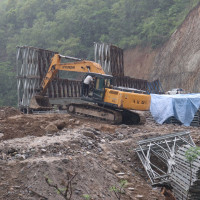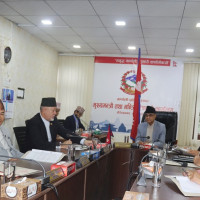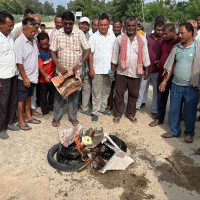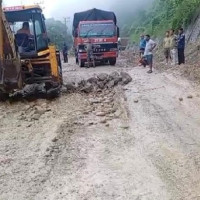- Wednesday, 6 August 2025
Monkeys raiding Gulmi villages; Mayor Panthi seeks solution
By Tilachan Pandey,Tamghas, Dec. 23: With rocks in both her hands, 52-year-old Rumkala Khatri is sitting in the yard of her home in Dubichaur village, Resunga Municipality-13, Gulmi. She sits out like this, all day, every day, to look out for intruders who come to her house without fear and eat all the food grains.
"They have no fear, I tell you," she yelled. "That is why I have these rocks. I have to hit them with it to make them go away." The monkeys have been troubling Khatri and her neighbours for years.
Previously, the simians only used to come in the fields. But now, they raid people's homes. "The pesky primates us to abandon farming. Now, they are forcing us out of our homes," Khatri complained.
Unable to defeat the monkeys, many kept their land fallow, Khatri shared with The Rising Nepal. The uncultivated land gradually turned to forest. This led to an increase in the number of monkeys and a rise in monkey menace.
Bel Bahadur Basnet, a businessman in the same village, also keeps stones like Khatri. He has tried to plant potatoes in the land near his shop but monkeys have not let him. "Monkeys have become our biggest enemies. They seem determined to push us out," he expressed his sadness.
This "monkey harassment" is providing an additional reason for people to leave villages, he said.
Lumkala Thapa, 74, said that the monkeys had become especially aggressive in the past six years and they created a vicious cycle. "Monkeys made people leave. This left land and houses empty. The empty land and houses were claimed by trees and bushes. This attracted more monkeys which, in turn, pushed more people out."
Last year, seventh grader Samjhana Thapa was viciously attacked by monkeys when she was returning home from school. The incident scared many parents and prompted them to leave with their children.
Absence of youths exacerbates problem
Local Min Bahadur Khatri said that the monkey problem was exacerbated by a lack of youths in the village. "Sons work abroad, daughters-in-law live in the cities with the kids, only old people are left in the area," he said. "Old people cannot chase away monkeys."
Half of all houses empty
Nearly 50 per cent of the houses in Siran, Harrarukh, Sallarukh, Dandabari and Kalleri areas in Dubichaur are now empty because their owners have migrated elsewhere. Villager Lokendra Khatri said that the emigration rates had skyrocketed in the past six years due to the monkeys.
Urmila Khatri said that people left because they could not bear the pain the monkeys were causing. "We plant crops, care for them and work hard in our fields throughout the year. But when it is time to reap the rewards, the monkeys destroy everything. It is heartbreaking."
Sudip Khatri, secretary of the Free Students Union of the Resunga Multiple Campus, worried that if the monkeys were not brought under control, Dubichaur would lose all its residents in the next five years. "If the federal government does not do anything, our hills will be filled with monkeys, not people."
Resunga's Mayor Khildhwoj Panthi also stressed that the federal government needed to provide a solution. He said that the local level had asked the centre to allow people to kill monkeys if they intruded on private land, just like it has for boars. If that is not possible, he asked the federal authorities to look into relocating the simians.
















